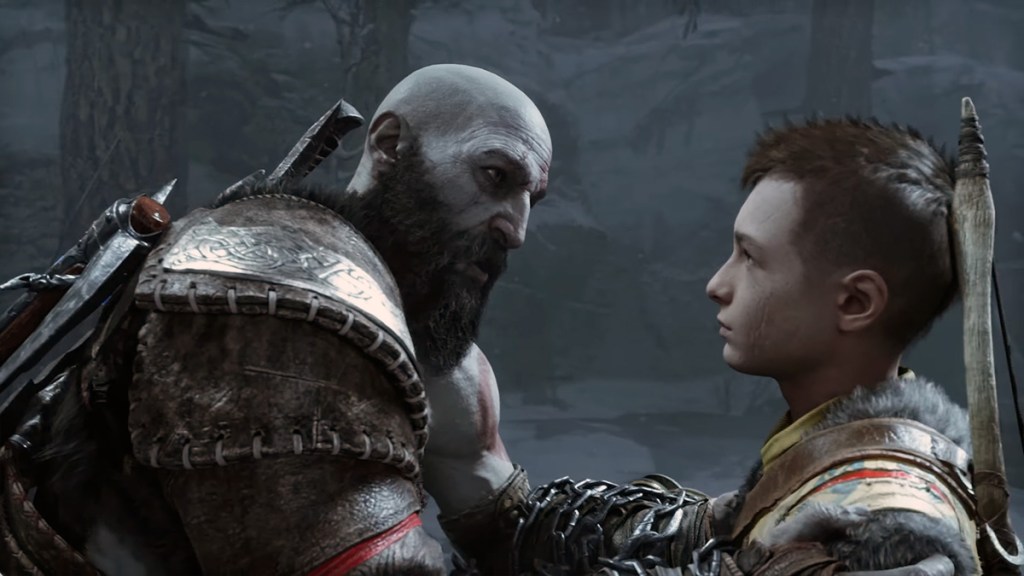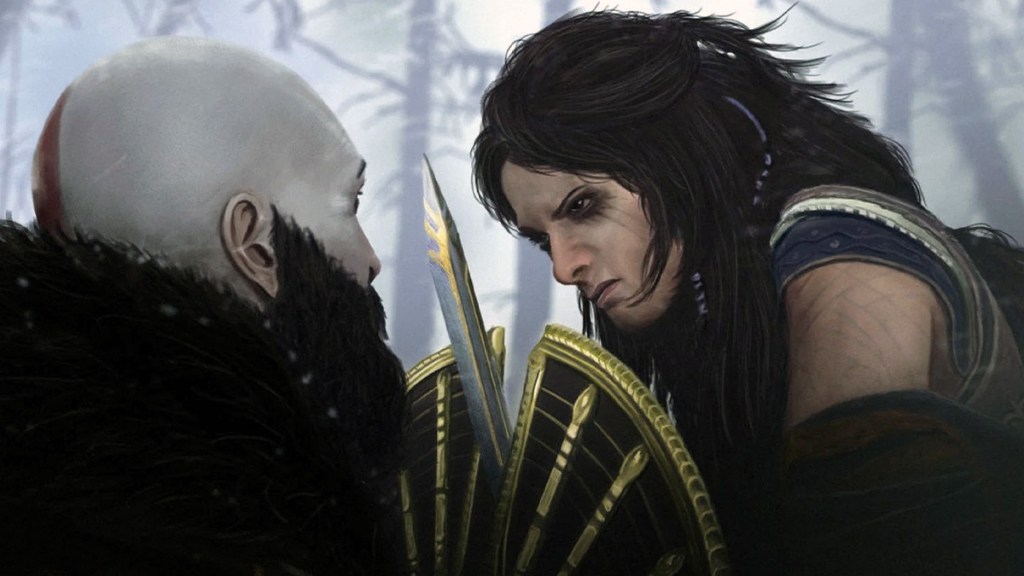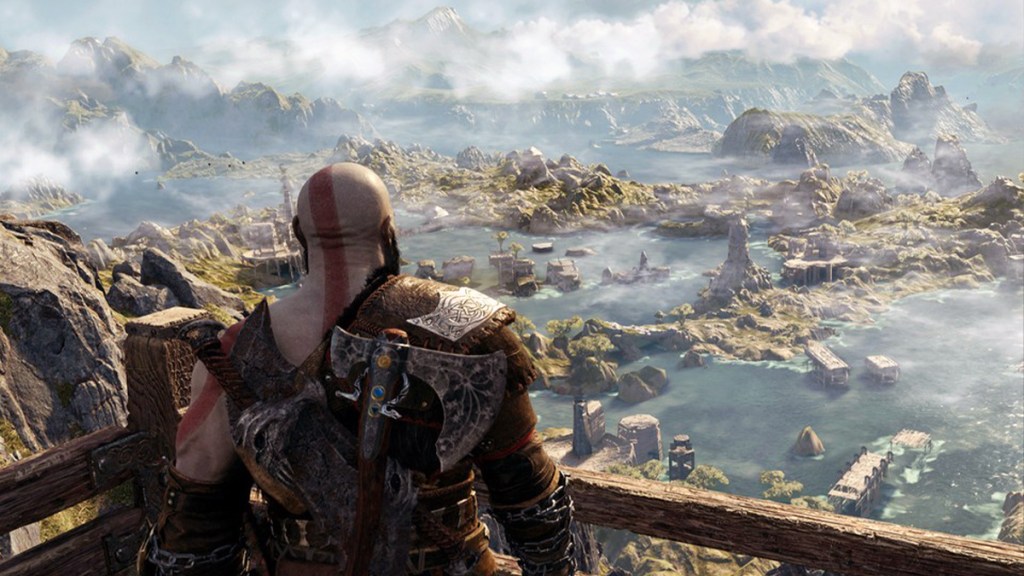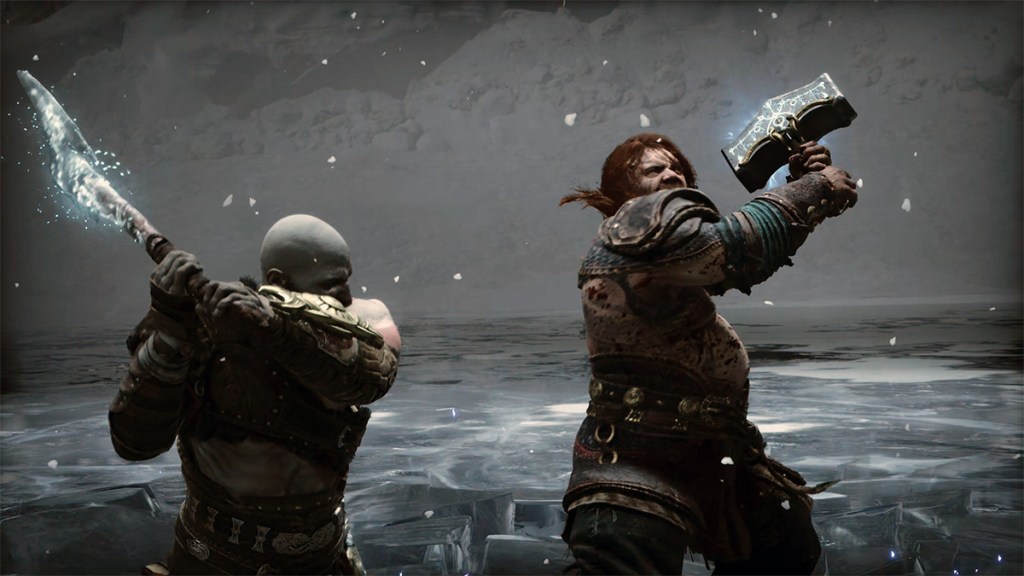God of War (2018) is a tough act to follow. It got the highest possible scores from tons of publications (including us) and has sold over 23 million copies. We called it a “console-defining” game for the PS4. So, needless to say, there are big expectations for God of War Ragnarök.
Fortunately, Ragnarök manages to meet and even exceed the hype for the most part. It’s bigger, bolder, and packed with more adventure than its predecessor. Unfortunately, a lackluster final act means it falls a little short of perfection.
Ragnarök and Roll

God of War Ragnarök starts three years after the previous game’s ending. Baldur’s death marked the beginning of Fimbulwinter, in which snow and blizzards engulfed all of Midgard. Because of this, Tyr’s Temple and the Lake of Nine have become an icy wasteland, making realm travel impossible.
In the three years since Atreus and Kratos returned from Jotenheim, they’ve been training. Still mad with the desire for vengeance, Freya continues to hound them, but Faye’s protective barrier keeps her at bay.
The two have tried to figure out a way to prevent Ragnarök and stop the destruction of all the realms except Asgard. Unfortunately, since the two have been stuck in Midgard, they have yet to make much progress. However, it comes to light that Atreus has been sneaking out of the protective barrier and has found an alternate prophecy that predicts an outcome exactly the opposite of what the original states. In it, the realms unite against Aesir during Ragnarök, defeat Odin, and destroy Asgard.
The catch is that at the end of the last game, there was a mural amongst the giant prophecies that said Kratos would die during Ragnarök. So, the big dilemma throughout the game is whether to prevent Ragnarök and keep the status quo, which potentially would save Kratos, or risk it all and try to ensure Asgard falls.
A recurring theme throughout the game is whether the characters’ fates are predetermined. The giants left behind many prophecies, all of which seem to come to pass despite the group’s best efforts to stop them. So, could they stop Ragnarök if they wanted to? Or are they locked into a course of action they can’t change despite knowing what the future holds.?
In the background is Kratos’s struggle to let Atreus be his own person. In the three years that have passed, Atreus has grown into a young man. It’s a hard transition for Kratos, who has only barely grasped the role of fathering a boy, to now look at him as a man.
Twilight of the Gods

The story is suitably epic, as you might expect from a game about Ragnarök. The cast is much expanded from the last part of the journey, and you’ll meet many people and see many sights that were only hinted at before. For example, Svartalfheim, home of the Dwarves, gives us our first glance at (an existing) civilization and lets us know what’s at stake if Ragnarök proceeds as prophesized.
Playing straight through with no detours will take you around 20-25 hours. However, it felt much longer (in a good way) because of how much territory you cover. This time around, you’ll visit all nine realms, and the game’s scope is much greater.
Despite the larger amount of territory, the pacing is excellent for most of the game. However, Santa Monica Studio’s desire to end the Norse storyline with Ragnarök resulted in the last bit feeling rushed. A few plot points, which are discussed multiple times throughout the game, end up being glossed over or dropped completely without explanation. Given how dense the game already is, it wouldn’t have been a reach to make it the second part of a trilogy.
Regardless, with God of War Ragnarök, it’s more about the journey than the destination. But, of course, when you have a cast of beloved characters, any ending will be bittersweet. So even though it didn’t quite stick the landing, it’s an immensely satisfying adventure overall.
Side Hustle

Like in the previous game, there’s an ebb and flow between story missions and exploration. Again, the main quest is relatively linear, but there are many more side quests and optional content this time.
God of War’s open-world gameplay primarily centered around the area around Tyr’s Temple and a few smaller areas in other realms. On the other hand, Ragnarök has large open spaces in several realms that you unlock over the course of the game.
There’s a lot more environmental variety as well. As much as I love the Lake of Nine and paddling around in a boat, it was great to take a different mode of transportation for a change. The deserts of Alfheim, verdant forrests of Vanaheim, and snowy drifts of Midgard are amongst the places you can seek out knowledge and treasure. Each of them contrasts with the other not only in color palette but also in enemy type. Each realm consists of a different biome, and you’ll run into unique enemies, obstacles, and endemic life in each of them.
The side quests are worth taking on for the lore alone, which is greatly expanded. Even the collectibles are woven into a tale or one of the character’s personal stories. So, even if you’re throwing your ax at 48 spectral crows, it feels like you’re doing something that affects the world instead of just ticking a number upward.
Unfortunately, since it’s a cross-generation title, Ragnarök doesn’t entirely take full advantage of the PS5’s power. There are still plenty of places you have to slowly climb a cliff or travel through a long tunnel so the PS4 has time to load the next area. I hope we’ll see that trend die off soon because it’s started to wear as thin as regular loading screens at this point.
Blades of Chaos
Combat in God of War Ragnarök only gets a slight overhaul. Kratos plays the same for the most part, aside from superficial changes. He does get some new combat options later in the game, but if you pick up the controller straight from God of War (2018), you’ll feel right at home.
One thing I’m not fond of is the removal of the shield skill tree. While you can still parry and shield bash, it’s missing most of the moves that made it a stun combo monster in the previous game.
Elemental attacks are more important this time around. Holding triangle will charge a weapon with its signature move, imbuing it with elemental power. Some enemies have an elemental weakness by default. In contrast, others can generate elemental shields to protect against a particular type of damage.
The combat is still fun, and it’s a blast to rack up a big combo while switching between weapons. It continues to rely heavily on juggling, timing, and stunning, which gives it a bit of a fighting game feel.
There’s more to say about the combat system, but some aspects of it are unlocked via story events. So, instead of spoiling the fun, I’ll wrap it up by saying the fighting in this game is more of an evolution of the previous title than a reimagining. However, there are more options for defeating your foes overall.
God of War Ragnarök Review: The Final Verdict
God of War Ragnarök is a triumph. It’s a swansong for the PS4 and one of the best first-party games for the PS5 so far. It’s bigger than its predecessor in every way.
The game’s only flaw is the weak climax. Everything up to that part is gold. However, it’s hard to find a conclusion that’ll satisfy everyone when the stakes are basically everything.
Positives and Negatives
-
A huge world filled with lore and adventure.
-
Tons of side content that feels connected to the overall story.
-
An excellent and expansive story that explore tons of concepts and characters that were hinted at in the previous game.
-
Rushed ending that skims over or drops plotlines that have been discussed as far back as the first game.







